Why You Should (& Shouldn't) Build A Book For Your Community
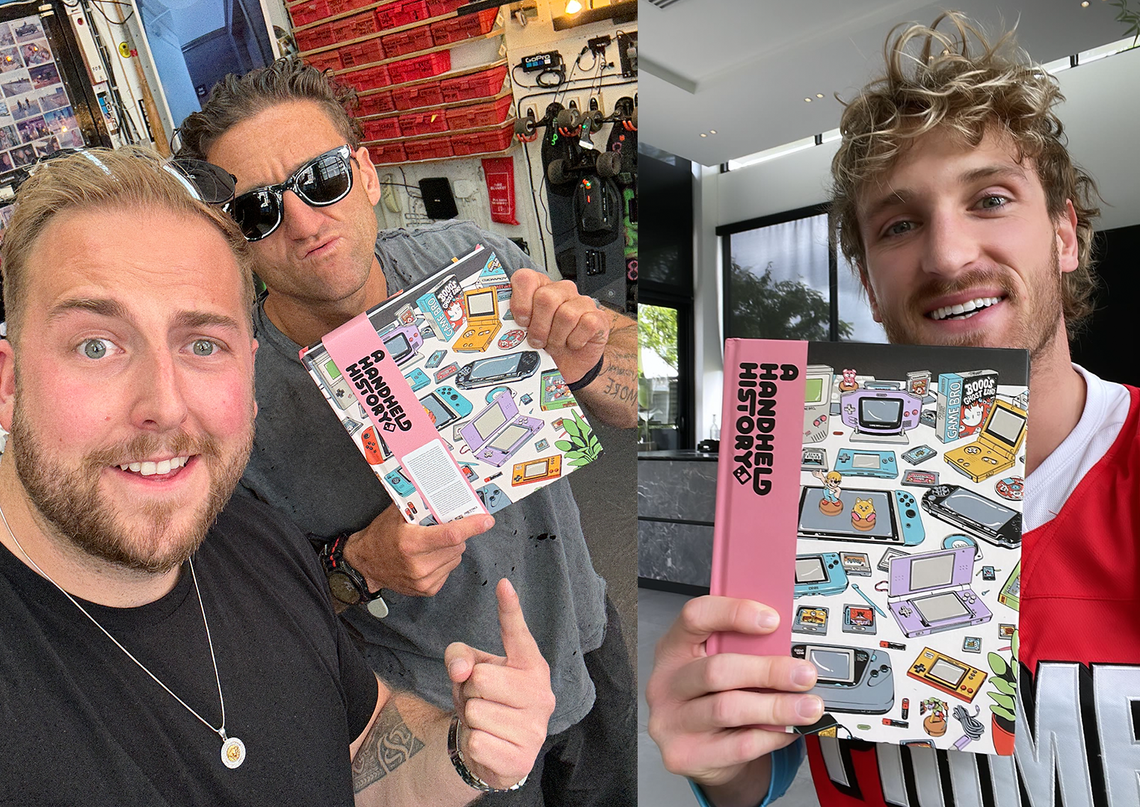
As I write this article, my second book built for Retro Dodo will start being delivered to customers door steps. A Handheld History has grown into a brand itself, a piece of physical media that our audience can consume and enjoy for years to come, which partners with our online content perfectly.
Our first book was so successful that Harper Collins (the second biggest publisher in the world) wanted to become our exclusive publisher, allowing us to put it into physical retail stores across the world and it was one of the best selling gaming books on Amazon for a couple of days too.
Building two books of this calibre was an exhausting yet fulfilling experience, but it's not something I would like to repeat anytime soon.
Building books for a community is a great start in developing products for your audience and there's many publishers that would be willing to work with you on a partnership if you have a loyal audience. Or you can use crowdfunding marketplaces to do it yourself should you have the drive to do so, self-publishing is something I do not have experience in.
This article was sparked into production when I was consulting a large media company about building their own book. They wanted to understand how we marketed it and what struggles we met in production, so I thought this article would be good for those of you looking to do something similar.
How the idea came to fruition.
I have always wanted a book about handheld gaming consoles, I have a deep passion for them, yet there was no high quality, coffee table book about them that went into incredible detail. I had built a community of handheld enthusiasts over the years, so I tweeted about my intentions on building this exact book in 2021.
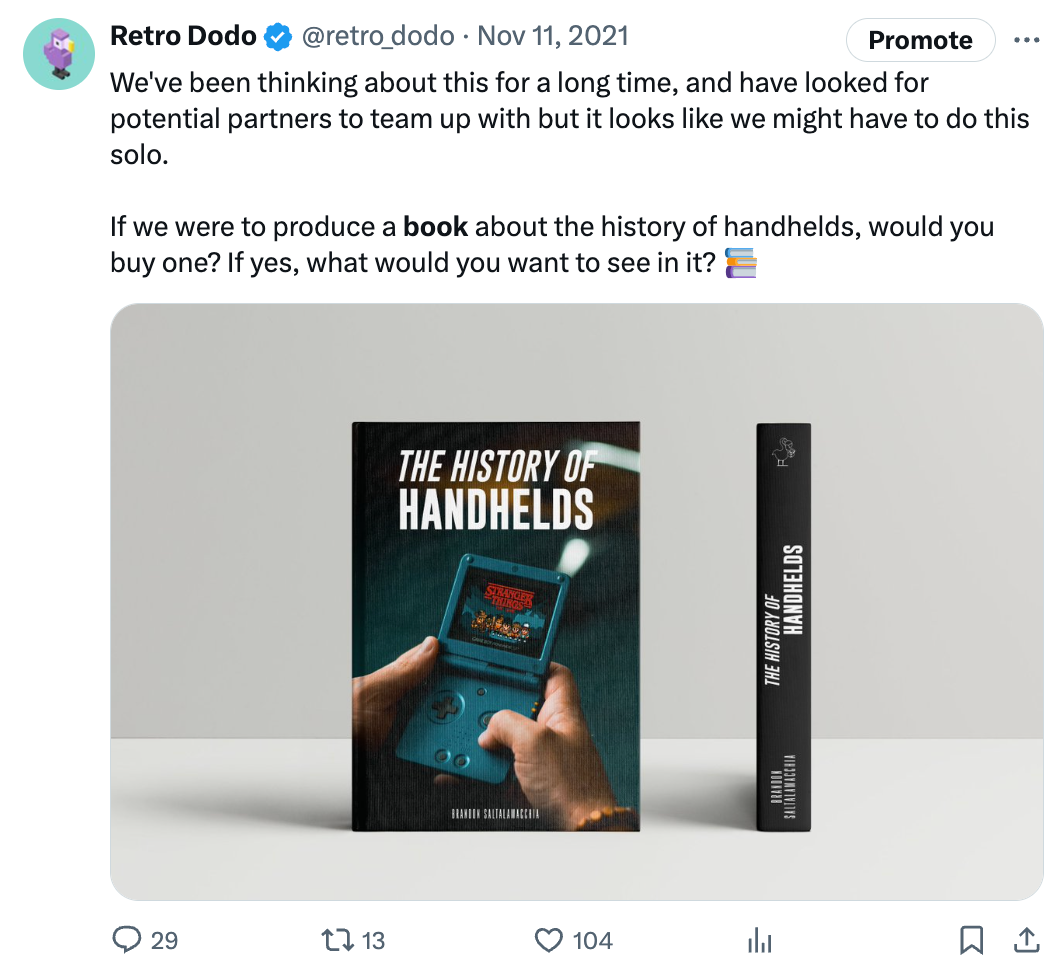
I was ready and motivated to go at it solo because the publishers that I wanted to work with either took too much of a cut, or I had to pay upfront for their service, two things I didn't want to do (or could afford to do). That's why I was willing to create a Kickstarter campaign to fund it myself.
But shortly after this tweet, a start-up publisher called Lost In Cult who was located just 45 minutes from where I lived contacted me and was more than happy to partner with us on it, with a respectable and fair share in revenue.
It was a risk for both of us, but we agreed to take the shot and build one of the best gaming books ever made.
We succeeded.
The deal
The deal between both parties was that I head up the marketing and our publisher heads up the production. It was my role to get the word out about the product, use my audience to create hype for the crowdfunding launch and work with as many creators as possible to make this book a community driven production.
It was the perfect partnership.
Building The Book
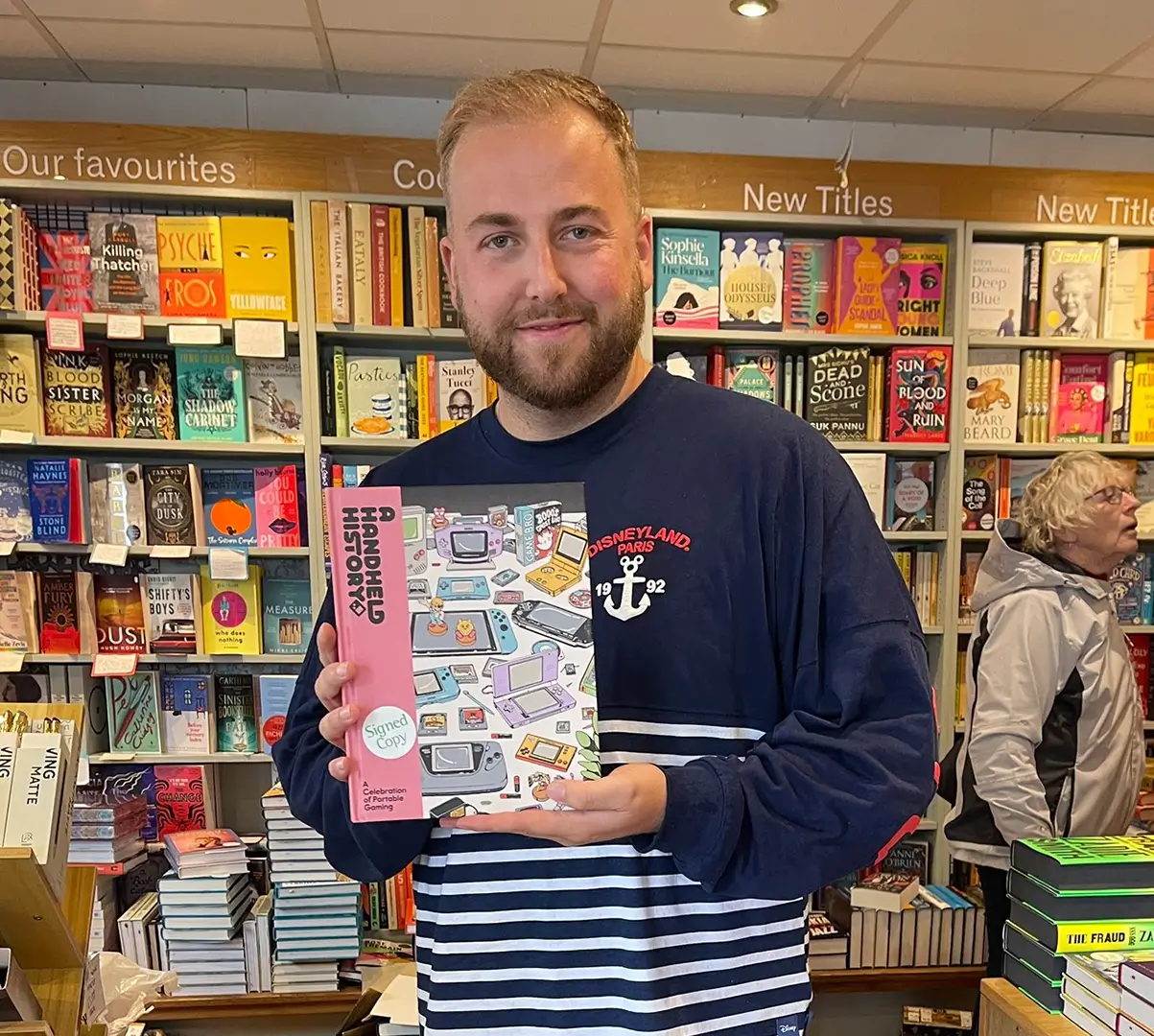
Because we already had an audience that was passionate about retro gaming and we were an authority in the space, it was somewhat easy to contact journalists, artists, content creators and celebrities (yes we managed to get a well known gaming/tech celeb involved in the book too, known as Jason Bradbury) and ask them if they would like to do a paid contribution for the book.
My marketing plan was to get as many collaborators involved in the book, instead of it being written by just one person. Both books ended up having well over 30+ collaborators involved, from journalists, to graphic designers to photographers, all with an audience in the gaming community.
Not only did this help speed up production because all the content was due on a certain date (and not a task of just one person), it was also one of the biggest marketing advantages too, opening our book up to 30+ new audiences, and the collaborators who were apart of the book were kind enough to share it across their social channels when we began crowdfunding.
This worked incredibly well and the book took over the retro gaming news industry. It was almost impossible not to see our books on your feeds at the time.
It was an incredible product, produced by the whole retro gaming community from across the globe, and as soon as we launched it created an overwhelming amount of attention AGAIN, and was even picked up by other publishers too, creating a tonne of high quality backlinks from some of the biggest gaming/tech websites in the world, all pointing to Retro Dodo.
The launch was a huge success. Not only was it a huge revenue driver, it provided tens of thousands of dollars worth of backlinks, it introduced me to incredible talent within the industry and put our brand in the eyes of a lot more retro gamers.
Finding A Sponsor
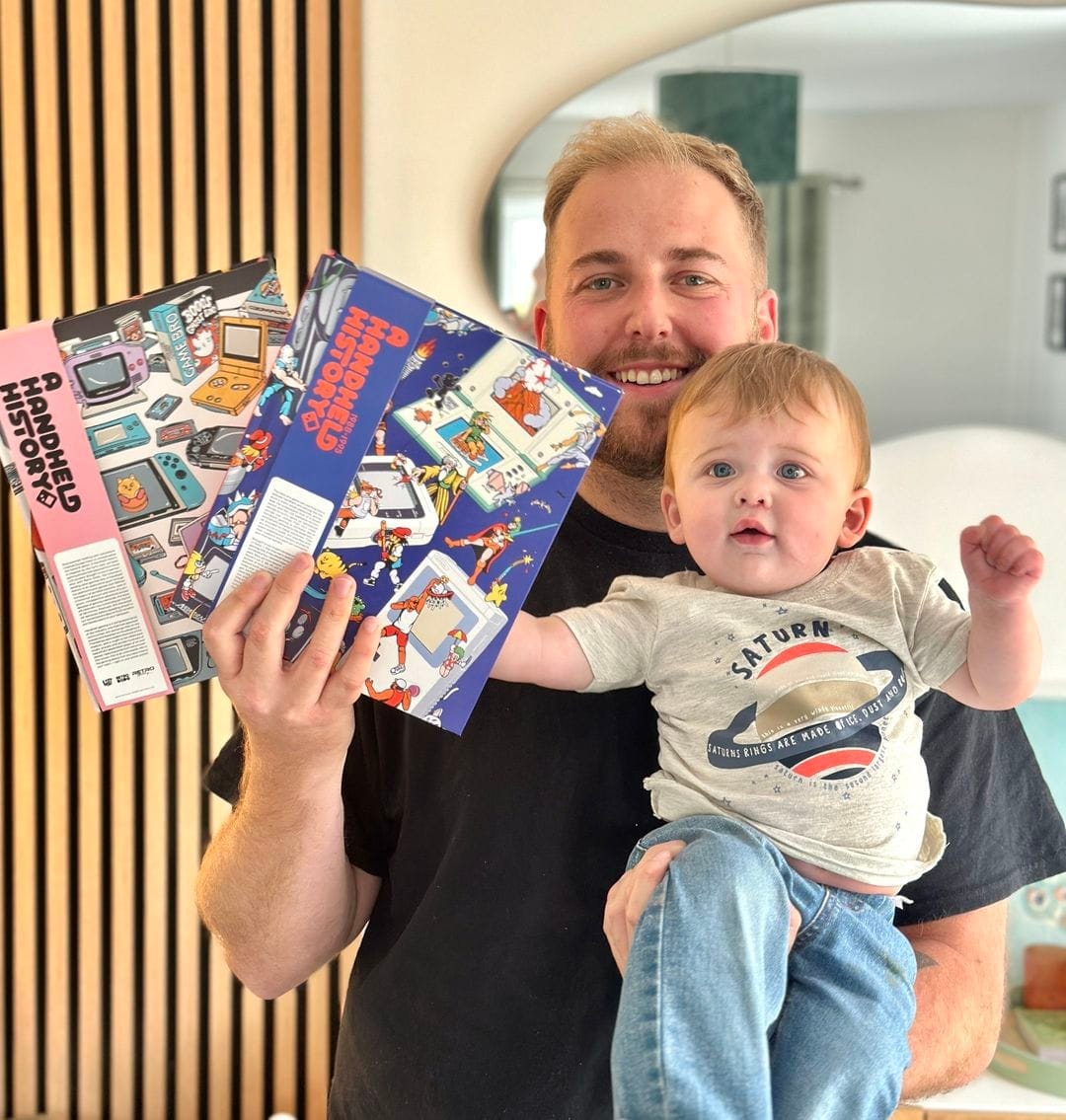
Before the launch, we had no idea just how well it would do, and our crowdfunding goal was approximately £15,000 to make it a reality, and take a small profit. So I came up with the idea to get on board a few sponsors.
It would be a small fee to be apart of the book, featured in the partnered section and across some of our marketing/social posts about the book.
We did this for both books and it helped get the books off the ground and was a big revenue driver too. I even flew to Canada to meet our sponsors for the second book face to face.
This certainly helped the overall campaign. It was a small % of our crowdfunding goals but nonetheless a mandatory financial boost that we needed, but it did come with some negatives. The main negative being that we had to create value for the sponsor throughout the whole launch, and be on top of them constantly with updates and stick to our promise of featuring them in social posts.
Like any crowdfunded project, we hit hurdles. Hurdles that pushed back the launch considerably, meaning we had to give more and more value to the sponsors throughout the length of the campaign and after launch.
A small slip up with some missed newsletter mentions and social posts (which was admittedly our mistake) means that one of our sponsors wanted some reimbursements which took up a lot of our time to come to an agreement.
It was our mistake, but a mistake that costed us time, stress and money. So if you are working with sponsors on your upcoming books, make sure the contracts/agreements are incredibly specific with what is given as "value" and the length of the partnership.
Nonetheless, it's highly recommended to work with brands to help with funding. Our partners now have their name in tens of thousands of our books for eternity and are apart of one of the best gaming books of all time, and that can be priceless to the right sponsors.
Distribution Chaos
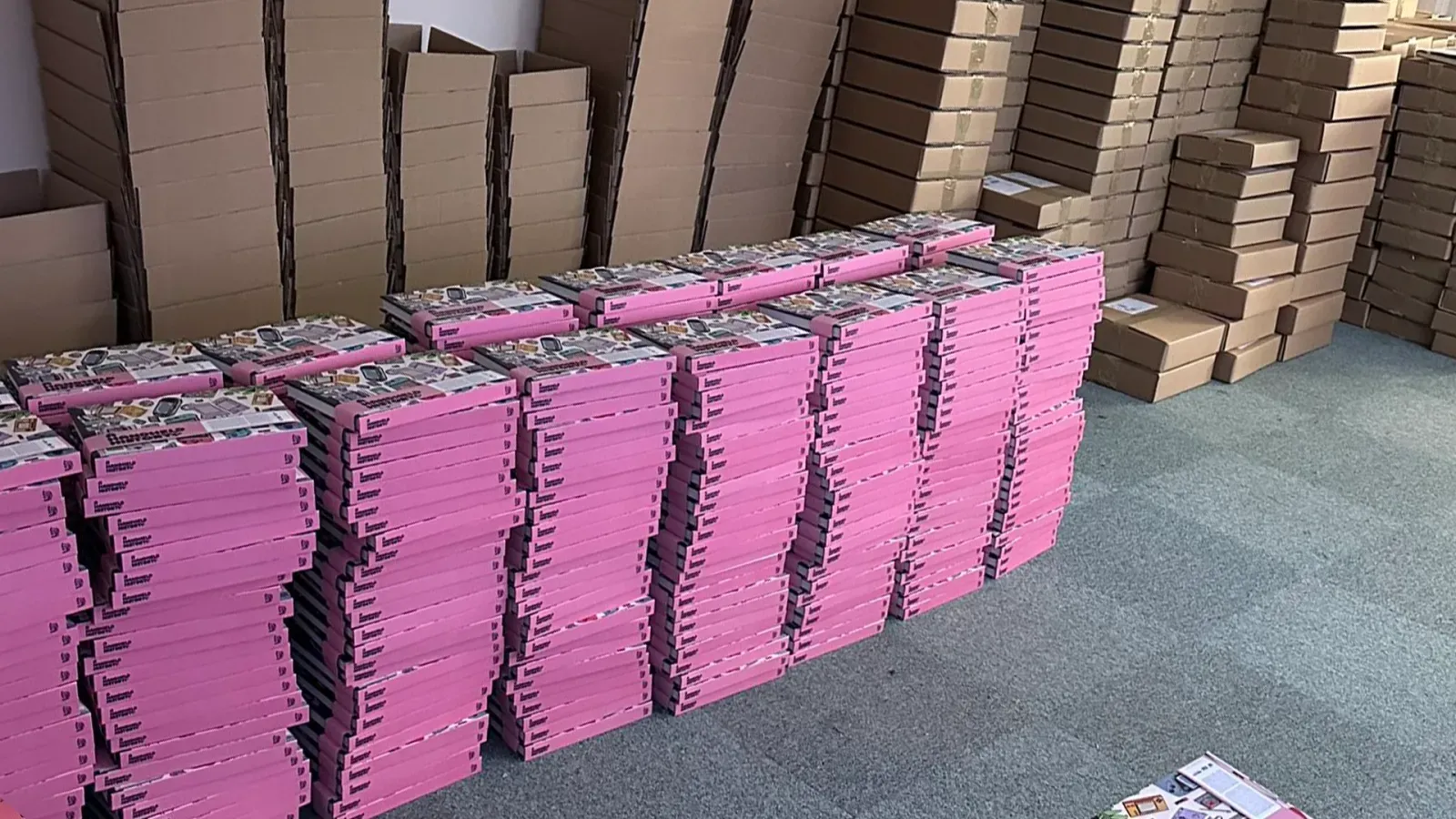
Our crowdfunding campaign for the first book was a huge success, making over $100,000 in revenue. Because we were a small team we had to distribute the first book ourselves which meant picking, packing and shipping thousands of books.
Distribution should be planned before launching your books. If you are doing it in house you will need to plan how you actually pack and ship your books depending on how many you sell.
A few hundred can likely be done in your own home, but a few thousand is a completely different story and should be planned in "milestones". If you hit a certain amount of sales for example, a distribution partner would be helpful.
This took us a whole week of hard physical work, while renting out a warehouse to do it all in, we also had some friends help with wrapping the books up, adding labels and organising Royal Mail to pick up hundreds of boxes every single day for over a week.
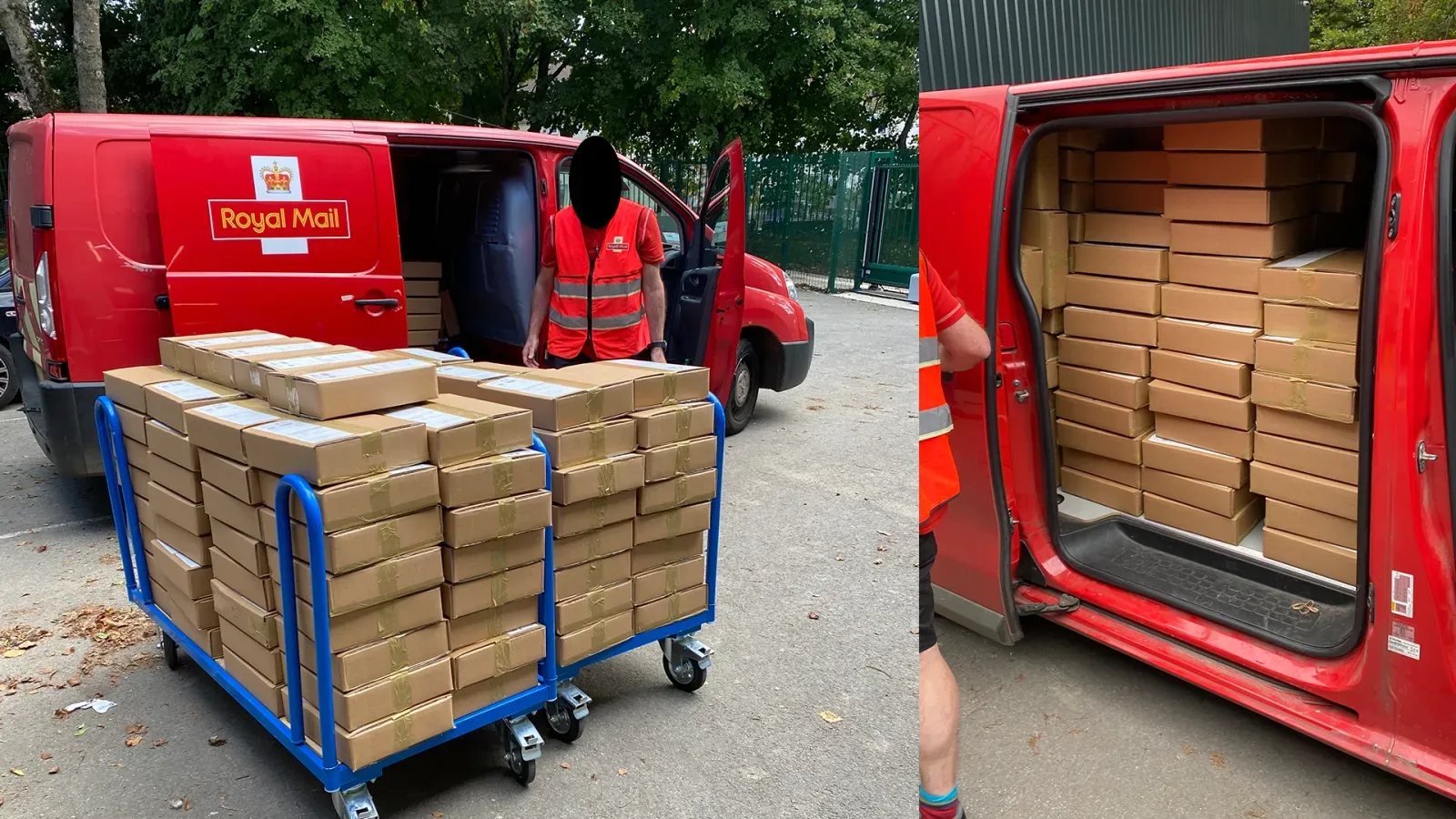
I'll admit, our publisher dealt with most of this, but I was there for the whole week packing and assisting with the distribution, packing, wrapping, labelling and so on.
We had some extras for our "premium" customers who purchased special additions, alongside the addition of some sponsored flyers in our first book which meant we had to add posters and leaflets to every single order.
These are things you have to plan for, as they take up time, space and shipping costs.
But we got there in the end... with lots of paper cuts. It was such an incredible feeling seeing it land in customers hands on social media, in fact it was pretty emotional. The book I dream of owning, now made a reality because of myself and the publisher. It took close to 18 months to produce, and it was an incredible moment in my career.
For our second book we have a distribution company handling the whole process, so I don't have to lift a finger. This obviously cuts into costs, but it just means we can focus on marketing the book instead and carry on building our community.
The Benefits
A community member unboxing our book on YouTube.
There has been an overwhelming amount of benefits when making a book for our community. But the most important is putting smiles on our communities faces and seeing all the lovely comments.
It's the first time that I've given my audience "physical" value and it feels really good to finally move from digital media, to a physical piece of content our audience can enjoy for years to come.
For those wondering the business benefits, they are the following:
- Five-figure revenue that is still dripping in today, creating a new semi-passive revenue stream that doesn't really on display-ads.
- An array of backlinks to our website, and features from some of the biggest gaming and technology websites in the world.
- New learnings and experiences within the physical e-commerce world. I learned a lot throughout this process that will help me with our future products.
- I met an array of incredible people in the industry that has and will lead to future wins for us as a brand.
- Retro Dodo now seen by a whole new audience, and the book even landed into the hands of some of the biggest creators in the world.
The Struggles
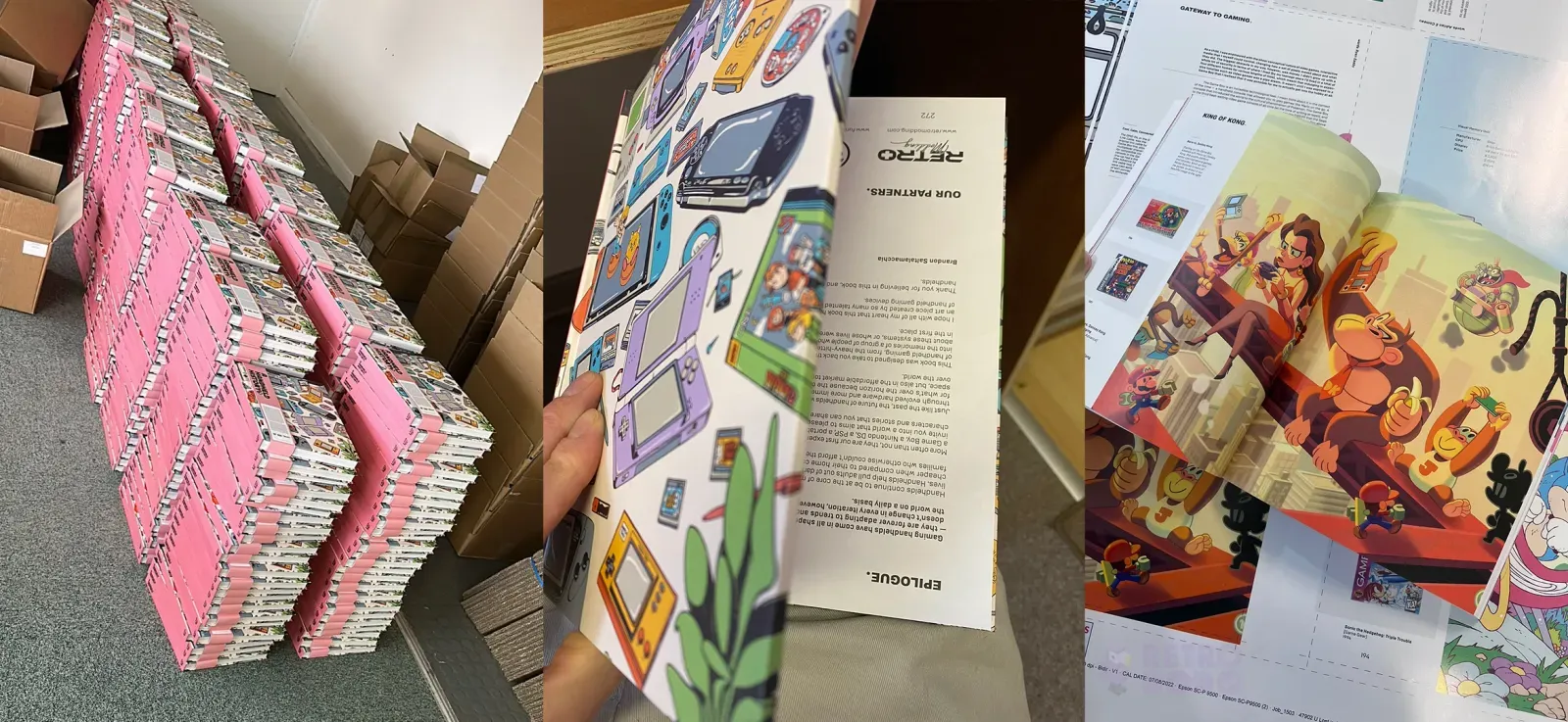
- Stressful times working with others, and at times showed me that I need to work on my managing/team work skills.
- It's a long process. It took us two years to finally get the first book into peoples hands, and the second book took 9 months longer than anticipated. Patience is key.
- Sometimes i found myself worrying if I wasn't putting in the same amount of work compared to our partners, adding worry to my plate and trying to push myself into work/meetings that I didn't need to be apart of.
- Some marketing tactics/strategies flopped. Areas where I thought our content marketing would work didn't so I had to own it, learn from it and move past it, but also discuss to the whole team why it didn't work which is never fun.
- Lots of time investment. Making a book isn't easy, and because I only had a small team at the time, working on the book would mean an area of the business wasn't getting the attention it deserved, and would therefore struggle. I guess this is just what it's like when I spin too many plates at once.
Overall it has been an incredible experience, and although I do need a break from making books it's something I would eventually love to do again, and perhaps expand the A Handheld History series even further.
If you need assistance planning a book launch, I do offer consultancy and would be happy to offer advice and tips to get your book project off the ground (from experience).
Good luck!

